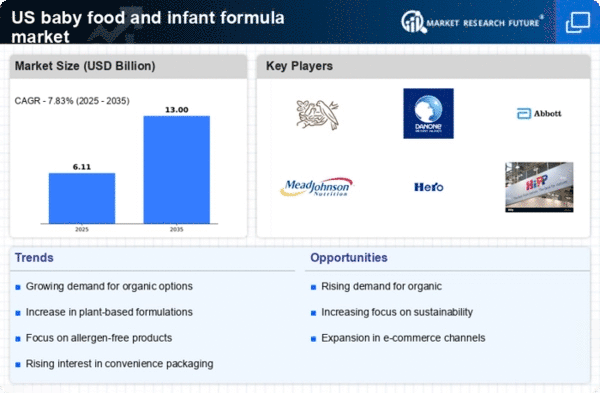Changing Family Dynamics
The evolving structure of families in the US is a notable driver impacting the baby food-infant-formula market. With an increase in dual-income households, parents are often seeking convenient and nutritious feeding options for their infants. This shift has led to a growing preference for ready-to-eat and easy-to-prepare products. In 2025, it is projected that the demand for convenient baby food options will increase by 20%, reflecting the need for products that fit into busy lifestyles. Consequently, manufacturers are likely to focus on developing products that cater to this demographic, thereby driving growth in the market.
Rising Health Consciousness
The increasing awareness among parents regarding the nutritional value of food is a pivotal driver in the baby food-infant-formula market. Parents are now more inclined to choose products that are rich in essential nutrients and free from artificial additives. This trend is reflected in the market, where organic and non-GMO products have seen a surge in demand. In 2025, the organic segment of the baby food-infant-formula market is projected to account for approximately 30% of total sales, indicating a shift towards healthier options. As health consciousness continues to rise, manufacturers are likely to innovate and reformulate their products to meet these evolving consumer preferences.
Regulatory Support and Standards
Regulatory frameworks governing food safety and quality are essential drivers in the baby food-infant-formula market. The US government has established stringent guidelines to ensure that infant food products meet high safety standards. These regulations not only protect consumers but also foster trust in the market. In 2025, compliance with these regulations is expected to enhance product credibility, leading to a projected growth of 10% in the market. As manufacturers adapt to these standards, they are likely to innovate and improve their offerings, thereby contributing to the overall growth of the baby food-infant-formula market.
Increased Marketing and Brand Awareness
The baby food-infant-formula market is experiencing a surge in marketing efforts aimed at educating consumers about product benefits. Companies are investing heavily in advertising campaigns that highlight the nutritional advantages of their offerings. This increased brand awareness is crucial, as it influences purchasing decisions among parents who are often overwhelmed by choices. In 2025, it is anticipated that marketing expenditures in this sector will rise by 25%, further solidifying brand loyalty and consumer trust. As brands strive to differentiate themselves, the market is likely to see a diversification of product lines and an emphasis on quality.
Technological Advancements in Production
Technological innovations in food processing and packaging are significantly influencing the baby food-infant-formula market. Advanced techniques such as high-pressure processing and improved packaging solutions enhance product safety and shelf life. These advancements not only ensure the preservation of nutrients but also cater to the growing demand for convenience among parents. In 2025, it is estimated that the adoption of new technologies could lead to a 15% increase in production efficiency, allowing companies to meet the rising demand without compromising quality. As a result, the market is likely to witness a proliferation of innovative products that align with consumer expectations.














Leave a Comment